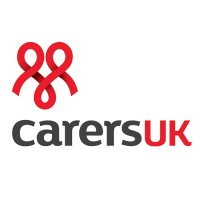Local authorities have a legal responsibility to help families with disabled children. Many children have additional needs and disabilities, and some are more severely affected than others. Some disabled children, their parents/carers and siblings will need practical support both inside the home and outside it.
Download Full Document booklet
Download Financial Assessment (Carers Assessment)

Table of Contents
Youtube Video
Feedback
Once you have completed the workshop, please take a few minutes to fill in the below feedback form.
Social Services and Legal Duties
Social services departments of local authorities are legally responsible for arranging support for disabled children, their siblings, and their carers.
You have a right to have your child and family’s needs assessed by social services. The legal duties of social services to disabled children and their families include:
- maintaining a register of disabled children
- providing information about services which may be available
- assessing the needs of disabled children and their carers
- providing a range of services to meet these needs.
Social services departments have a general duty under Section 17 (10) of the Children Act 1989 to safeguard and promote the interests of ‘children in need,’ and to promote their upbringing by their families. The law recognises disabled children as being in need.
Children in need are defined as children who are under 18 years of age and:
- are ‘unlikely to achieve or maintain, or to have the opportunity of achieving or maintaining a reasonable standard of health or development without the provision of services by a local authority’, or
- whose ‘health or development is likely to be significantly impaired or further impaired without the provision of such services by a local authority’, or
- are `disabled’.
Section 17 (11) of the Children’s Act 1989 states that a child is disabled if they:
- are blind
- deaf, or
- non-verbal, or
- suffer from a `mental disorder of any kind’, or
- are `substantially and permanently handicapped by illness, injury or congenital deformity, or such other disability as may be prescribed’
Where a local authority is under a duty to undertake an ‘EHC assessment’, this will include a specific duty to assess their social care support needs.
What support can the council offer?
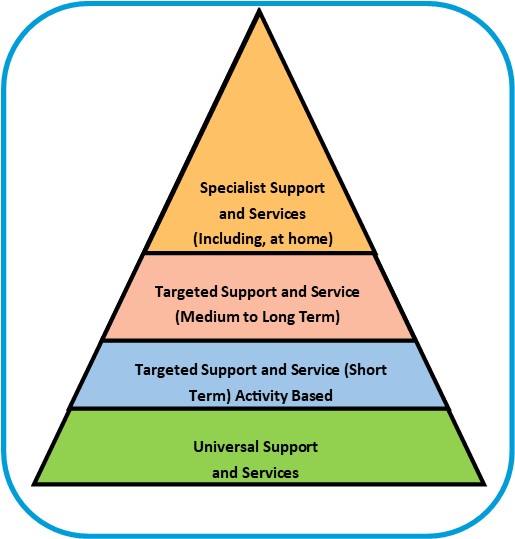
There are 4 levels of support you can access:
- Level 1: Universal Support and Services The child or young person will have some additional needs and/or a disability. They can access universal services but may need some information about what is available. Information about universal and targeted services can be provided by contacting the Disabled Children’s Service or the Local Offer. An assessment is not needed for you to receive information alone.
- Level 2: Targeted Support and Services (Short Term) Activity Based Breaks The child or young person will have additional needs and/or a disability. They will not be accessing any out of school activity and will need support to do so. The DCS will provide support to find and access one activity.
- Level 3: Targeted Support and Service (Medium to Long Term) Activity Based The child or young person will have additional needs and/or a disability, plus the child or young person will not be able to continue attending the activity without ongoing support. As level 2 with medium to long term support to continue to attend an activity. This may be a worker to support or a referral to a specialist service.
- Level 4: Specialist Support and Services Including At Home The child or young person will have additional needs and/or a disability and the child’s or young person’s needs are complex and having a significant impact on the family. These families are likely to be allocated a Social Worker or Occupational Therapist.
For more information on the “Eligibility Criteria” and what you can access, see the full document here.
How do I ask for an assessment for my family?
You can contact the Leicester City “Duty and Advice Service” for a new referral: 0116 454 1004.
For more information from the Disabled Children’s Service:
Website: Disabled Children’s Service Website
Phone: 0116 454 4710
Email: DCS@leicester.gov.uk
How do I access these services?

An assessment is the process social services use to gather information about your child and family, so they can make a decision about what help you may need. The process for carrying out an assessment is contained within statutory guidance, Working Together to Safeguard Children.
This guidance tells local authorities what they must do to meet their legal responsibilities to families with disabled children. It’s up to each local authority to decide how much detail is needed in each assessment, but the maximum time frame for any assessment is 45 working days from the date they get a referral.
Preparing for an assessment
It can be useful to make a list of questions before you meet, and you are entitled to have a friend or advocate there with you.
The social worker may also want to speak to your child’s health visitor, doctor or school to help them get a full picture of their needs.
What to expect at an assessment
A social worker will usually come to your home to talk to you. They should ask you for information about your child, for example, sleeping patterns, eating habits, how your child communicates, what activities they enjoy and, whether you have any other children to look after.
Don’t be worried about asking for clear information about the focus of the assessment. It is an opportunity to have a conversation about how to meet your child’s needs. But do remember that the assessment should be based on yours and your child’s needs, and not based on services already available.
What if an assessment has been carried out in the past?
When services are already being provided, the assessment should be reviewed regularly. But if your circumstances have changed, you can ask for a re-assessment or review in the same way you ask for an assessment.
What if I am refused an assessment?
If your child is disabled (and in need of services) you can’t legally be refused an assessment. You don’t need to have a diagnosis for your child to get an assessment or help from social services. It can sometimes take time before a diagnosis can be made for a number of reasons.
Moving into Adult Services
Disabled people over 18 years old have their needs met by adult care and support. This means that a disabled child receiving support from children’s services will be transitioned to adult care and support when they turn 18.
In England the rights to services and support for disabled adults and their carers are covered under the Care Act 2014. Provisions under the Act should ensure that there is no gap in services when a young person makes this transition.
In Leicester City, the Transitions Team works closely to ensure the move from Children’s Disabled Services to Adult Social Care is as smooth as possible.

For more on this, you can view the Leicester City Transition to Adulthood information guide here.
You and your family are entitled to a transition assessment if the young person is likely to have needs when they become an adult and require adult services.
How does it work?
You can request a transition assessment via an online form. The young person, parent, Carer, social worker or other professional can start the process.
Once the Transition Team has received a request, they will allocate your family with a worker. This worker will then visit you and your family, the school and any other professionals involved in the young persons care.
If support needs are identified, the social worker can help you and your family to arrange support.
If you are not eligible for adult social care support, the social worker will signpost you on to other services, voluntary agencies and support groups who can assist.
Carers and Young Carers
Your needs as a carer:
Any assessment of your disabled child should take into account the needs of the rest of the family members, including parents and siblings, and consider their needs as a Carer and capacity to continue with caring.
However, the aim of a Carer’s Assessment is to give you a chance to tell social services about the things that could make looking after your child easier for you. This may result in getting services or direct payments to meet your own assessed needs. Examples of services that can be provided include help with driving lessons, housework and gardening.
How to tell if you are a carer
You’re a carer if you’re looking after someone regularly because they’re ill or disabled – including family members.
Carers help with:
- washing, dressing or taking medicines
- getting out and about and travelling to doctors’ appointments
- shopping, cleaning and laundry
- paying bills and organising finances
They can also give emotional support by:
- sitting with someone to keep them company
- watching over someone if they can’t be left alone
The Carers Assessment
A Carers Assessment focuses on the carers and their needs. The key three questions you will be asked are:
- Are your needs the result of providing necessary care to someone?
- Does your caring role affect your ability to achieve any of the outcomes below?
- Is there a significant impact on your wellbeing as a result of the above?
Outcomes
Social Services will assess if the carers physical or mental health is, or is at risk of, deteriorating, or the carer is unable to achieve any of the following:
- carrying out any caring responsibilities the carer has for a child
- other parenting or caring responsibilities for a child
- providing care to other persons for whom the carer provides care
- maintaining a habitable home environment
- managing and maintaining nutrition
- developing and maintaining family or other significant personal relationships
- accessing and engaging in work, training, education or volunteering
- making use of necessary facilities or services in the local community including recreational facilities or services engaging in recreational facilities.
For more, and where to apply, visit the Leicester City Council portal here.
Wellbeing covers the areas below:
- personal dignity (including treatment of the individual with respect)
- physical and mental health and emotional wellbeing
- protection from abuse and neglect
- control by the individual over day-to-day life (including over care and support provided and the way it provided)
- participation in work, education, training or recreation
- social and economic well-being
- domestic, family and personal
- suitability of living accommodation
- the individual’s contribution to society.
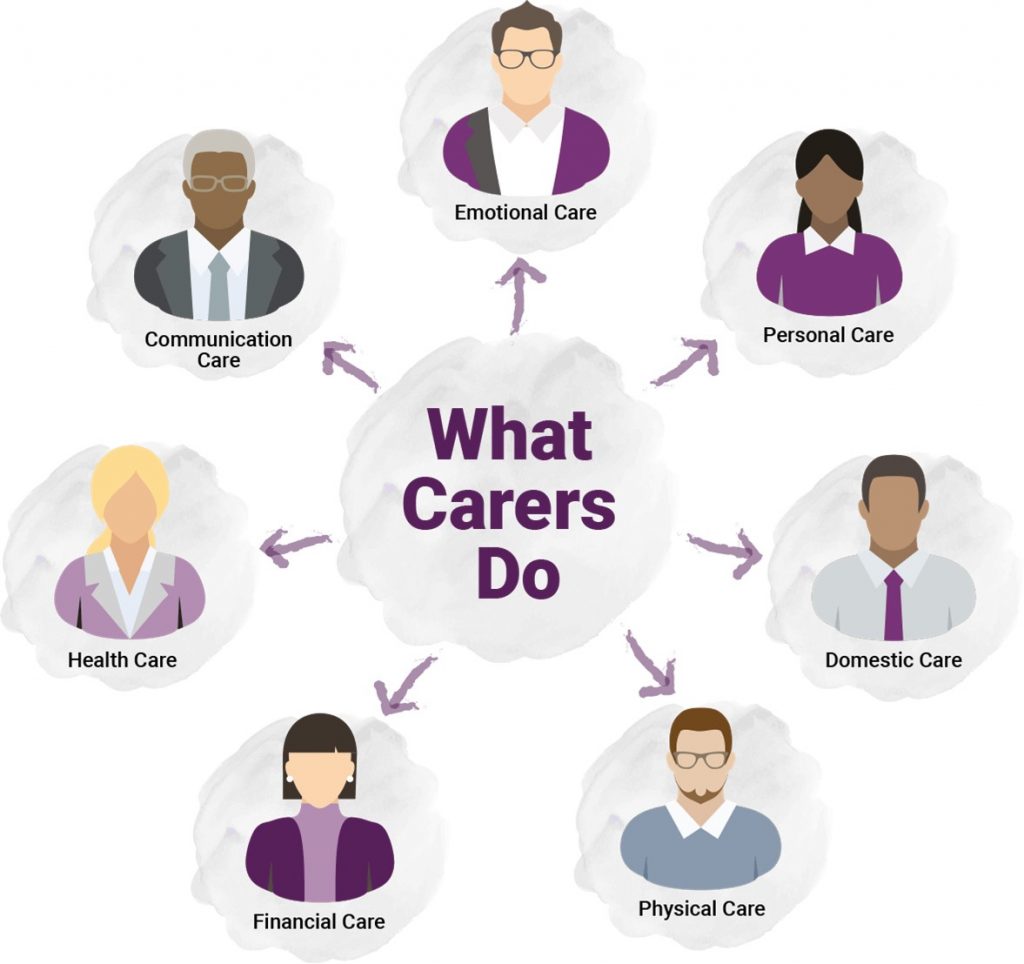
Young Carers
Young carers are children under 18 with caring responsibilities, and their rights to be assessed come mostly from the Children Act 1989 and the Children and Families Act 2014.
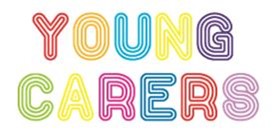
A young carer probably cares for a brother or sister. They may do extra jobs in and around the home, such as cooking, cleaning or helping someone get dressed and move around.
They may also give a lot of physical help to a brother or sister who’s disabled or ill. Along with doing things to help their brother or sister, they may be giving them and their parents emotional support, too.
A young person or their parents can request a Young Carers Assessment to have a social worker assess the needs of the family.
For more information about Young Carers and their rights, contact the Barnardos CareFree Young Carers’ Services:
Phone: 0116 286 7182
Email: carefree@barnardos.org.uk
What help might you get after a decision about your needs?
If the local council decides that you do have eligible needs, then providing you want them to, they have a legal obligation (subject to a financial assessment) to meet these needs and must draw up a support plan detailing how these needs will be met. It may be agreed that the best way to help you as a carer is by:
- providing services directly to you,
- by providing services to the person you care for, or
- a combination of both
You can download our Financial Assessment Document here.
The Support Plan
The support plan must include:
- details of the needs identified in the assessment
- which needs meet the eligibility criteria
- which needs the local council is going to meet, and how
- the outcomes that you want to achieve
- information about the personal budget available (the amount of money that the local council has worked out it will cost to arrange the necessary support for you)
- information about direct payments
- advice and information to support you in your role as a carer and address your needs.
For more information and examples, please see the Carers UK Help sheet here.
Leicester & Leicestershire Organisations:
Big Mouth Forum

A group created and run by children and young people aged 11 – 25, who have an additional need and or disability.
Website: Big Mouth Forum Website
Phone: 0116 454 4710
Email: dcs@leicester.gov.uk
Clasp the Carers Centre
 Leicestershire based charity, dedicated to supporting family carers who look after people with different needs. The Carers Centre is here to support all unpaid carers to understand what their rights and entitlements are and how they can access services to help them with their caring role.
Leicestershire based charity, dedicated to supporting family carers who look after people with different needs. The Carers Centre is here to support all unpaid carers to understand what their rights and entitlements are and how they can access services to help them with their caring role.
Website: Clasp the Carers Centre Website
Phone: 0116 251 0999
Email: enquiries@thecarerscentre.org.uk
Flat 108
A safe place where young people can get some extra support to be more independent.
Website: Flat 108 Website
Phone: 0116 204 6204
Email: Flat108@leicesterymca.co.uk
Home Start Horizons

Home Start Horizons supports families who have a least one child under five who may be dealing with issues such as:
- Social isolation
- Domestic abuse
- Lone parenting
- Poverty
- Illness and disability
- Post-natal illness
- Coping with several children under the age of 5
Website: Home Start Horizon Website
Phone: 01162 795062
Email: info@homestarthorizons.org.uk
LAMP Carers Group
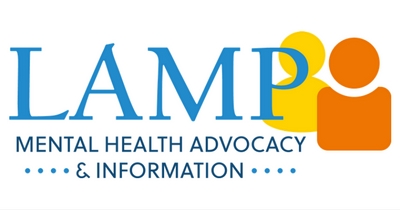
Lamp provides peer group advocacy where carers meet in a safe and informal environment to share successes and discuss challenges in their caring role. Our dedicated carers’ advocate facilitates the groups. The groups provide a range of activities and formal meetings and/or training to address challenges faced by carers in their caring role.
Website: LAMP Carers Website
Phone: 0116 255 6286
Email: rowenabland@lampdirect.org
Leicester Carers Support Service
![]()
Leicester Carers Support Service provides support and information to all Carers, over the age of eighteen, in the City of Leicester either at our Carers Hub, based at Clarence House, 46 Humberstone Gate Leicester or at other locations throughout the City.
Website: Leicester Carers Support Service Website
Phone: 0116 222 0538
Email: carers@ageukleics.org.uk
Leicester City Disabled Children's Services
 Support for disabled children, young people and their families ran by the council. This includes activities, support and services available to families, Preparing for Adulthood, Personal Assistants, Short Breaks, and more.
Support for disabled children, young people and their families ran by the council. This includes activities, support and services available to families, Preparing for Adulthood, Personal Assistants, Short Breaks, and more.
Website: Disabled Children's Services
Phone: 0116 454 1004
Leicestershire Centre for Integrated Living (LCIL)

LCiL is a User Led Organisation based in Leicester city that works in innovative ways based on the social model of disability to support disabled people at a local, regional and national level to exercise choice and control for independent living.
Website: LCiL Website
Phone: 0116 222 5005
Email: admin@lcil.org.uk
Parent Carer Forum

They engage with Parent Carers, the Local Authority, Health Services, Special Education Services, Disabled Children's Services, and the Voluntary Sector to co-produce, develop, improve and scrutinise the City's SEND services.
Website: Leicester City Parent Carer Forum (LCPCF)
Phone: 07455 745344
Email: info@lcpcf.net
National Organisations:
Barnardo's

Barnardo’s protect, support and nurture the UK's most vulnerable children. They help hundreds of thousands of children, young people, parents and carers via our 1000+ services across the UK.
Website: https://www.barnardos.org.uk/
Carers Trust
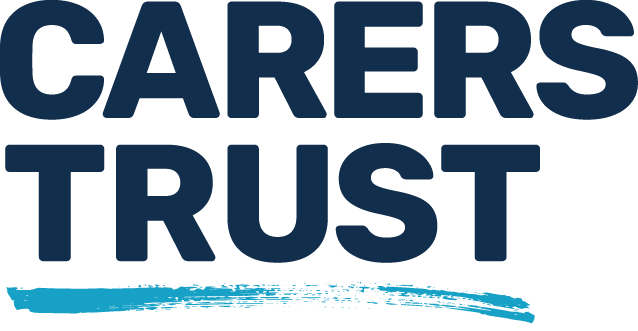
Carers Trust is a major charity for, with and about carers. They work to improve support, services and recognition for anyone living with the challenges of caring, unpaid, for a family member or friend who is ill, frail, disabled or has mental health or addiction problems.
Website: https://carers.org/
Carers UK
They give expert advice, information and support to carers and those being cared for. Caring can be extremely complicated. The maze of rights and entitlements can be complicated. Filling in paperwork can be complicated. Getting a break can be complicated. Our feelings about caring can certainly be complicated.
Website: https://www.carersuk.org/
Phone: 020 7378 4999
Citizens Advice
They give people the knowledge and confidence they need to find their way forward - whoever they are, and whatever their problem.
Website: https://www.citizensadvice.org.uk/
Contact A Family

Contact support families with the best possible guidance and information. They bring families together in local groups and online, to support each other by sharing experiences and advice. And they help families to campaign, volunteer, fundraise and shape local services to improve life for themselves and others.
Website: Contact a Family
Phone: 020 7608 8700
Email: info@contact.org.uk
Council for Disabled Children

The umbrella body for the disabled children's sector bringing together professionals, practitioners and policy-makers. Their website has a variety of information, help sheets and links to other organisations.
Website: Council for Disabled Children
Email: cdc@ncb.org.uk
Family Fund

Family Fund is the UK’s largest charity providing grants for families raising disabled or seriously ill children and young people.
Website: https://www.familyfund.org.uk/
Family Lives

Helpline for families to receive information and advice.
Website: www.familylives.org.uk
Phone: 0808 800 2222
Email: askus@familylives.org.uk
Family Rights Group

They work with parents whose children are in need, at risk or are in the care system.
Website: https://www.frg.org.uk/
Phone: 0808 801 0366
The Children's Society
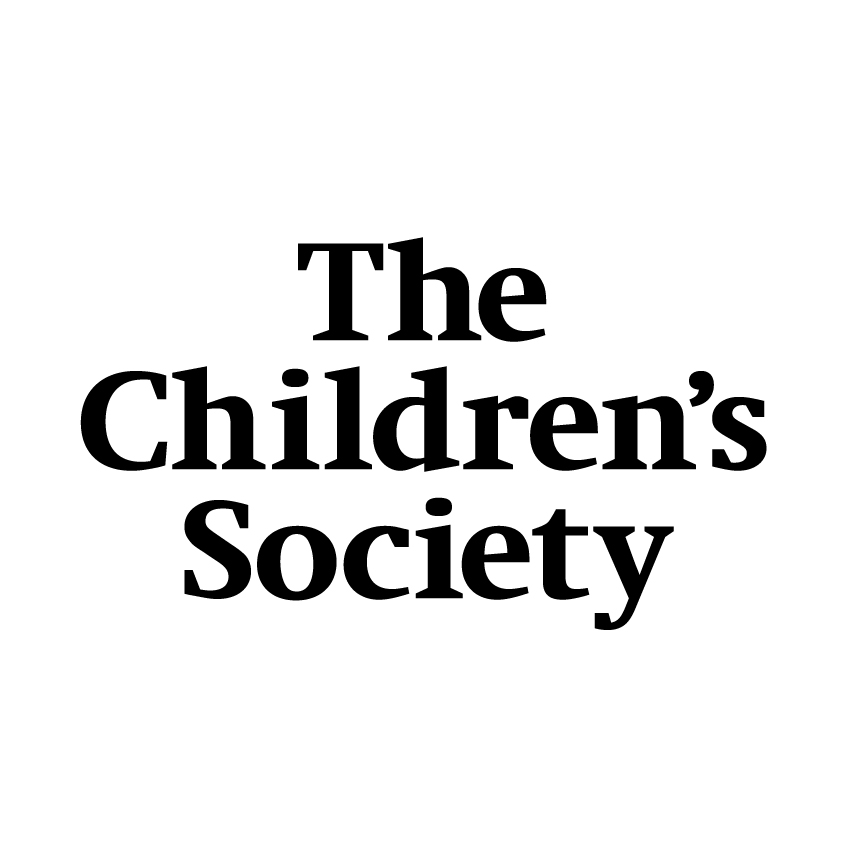
They work to empower young people to make positive changes and rediscover their hope.
Website: https://www.childrenssociety.org.uk/
Phone: 0300 303 7000
Email: supportercare@childrenssociety.org.uk
Turn2Us
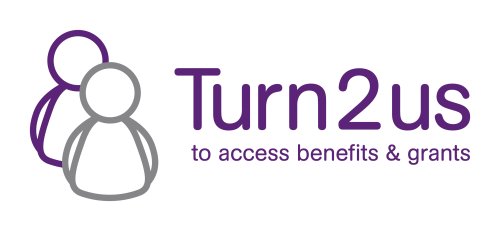
A national charity providing practical help to people who are struggling financially.
Website:https://www.turn2us.org.uk/
Useful Resources:
Contact: here.

